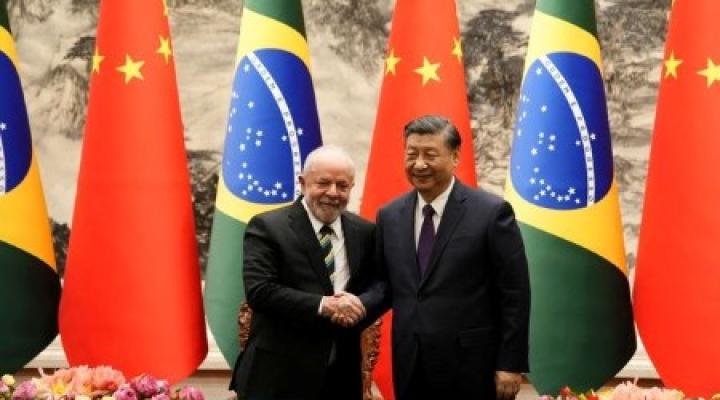BEIJING/BRASILIA, (Reuters) – Brazil reset its diplomatic ties with China, its largest trading partner, with a state visit today where they agreed to boost investments and cooperation on technology and sustainable development, while urging peace talks in Ukraine.
Brazilian President Luiz Inacio Lula da Silva and several of his ministers signed the accords with President Xi Jinping and other Chinese officials in Beijing.
Xi said China has made relations with Brazil a diplomatic priority and the two countries should deepen practical cooperation in sectors including agriculture, energy, and infrastructure construction, state broadcaster CCTV reported.
“We have an extraordinary relationship with China, a relationship that every day gets more acute and stronger,” Lula said before his meeting with Xi.
Brazil and China need to work together so that the relationship is not merely one of commercial interest, he added.
The two leaders agreed that dialogue and negotiation are the “only feasible way” to resolve the war in Ukraine, according to a joint statement. They called on other countries to play a constructive role in promoting a political settlement between Ukraine and Russia.
Lula’s visit follows four years of rocky relations with China under his far-right predecessor Jair Bolsonaro, when trade continued unaffected but investment by Chinese firms dropped.
In a new focus for bilateral relations, the two countries decided to strengthen cooperation in environmental protection and coping with climate change, and will set up a committee for this in their strategic partnership talks.
They agreed to act together with developing countries in international forums on climate issues while calling for increased financing for sustainable development projects.
China committed to backing clean energy and green hydrogen production in Brazil, but there was no agreement on a bilateral green investment fund that Brazil was hoping would finance and subsidize the development of renewable energy.
China and Brazil did agree to set up a working group to pursue cooperation on semiconductors, strengthening ties with Beijing in areas of sensitive technology.
Information technology has been a sticking point for China’s relations with the United States and European countries that have in some cases banned Chinese products for security reasons.
Brazil, however, is interested in attracting Chinese investment in these areas, despite pressure from the U.S. government in recent years discouraging the use of fifth-generation mobile equipment from tech giant Huawei Technologies.
Officials said Brazil is open to the installation of a Chinese semiconductor factory in Brazil and is interested in developing the technology in cooperation with China.
On Thursday, Lula visited Huawei’s research center in Shanghai and was briefed on its technology, also trying on its virtual reality headset.
Lula said in public remarks in Beijing that his Huawei visit was “a demonstration that we want to tell the world we don’t have prejudices in our relations with the Chinese.”
“No one will prohibit Brazil from improving its relationship with China,” he added.
China overtook the United States as Brazil’s top trading partner in 2009 and is a major market for Brazilian soybeans, iron ore and oil. Brazil is now the largest recipient of Chinese investment in Latin America, driven by spending on high tension electricity transmission lines and oil production.
On Friday, the two countries agreed to encourage their companies to invest in each country in infrastructure, energy transition, logistics, mining, agriculture and high-tech industries.
Brazilian Finance Minister Fernando Haddad said the two were deepening studies to conduct trade in local currencies, noting that the idea of lowering dependence on the dollar had long been on the agenda of the BRICS group of major emerging nations.





